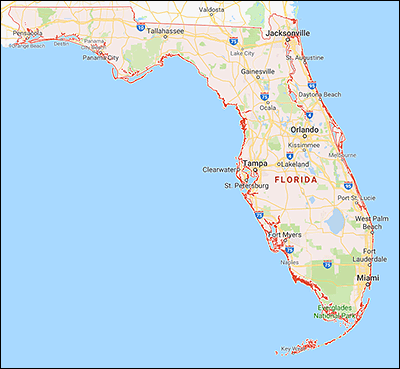Nov. 20, 2018 — In a final result where the candidates were divided by less than two votes per precinct statewide, Gov. Rick Scott (R) defeated Sen. Bill Nelson (D) in the hotly contested Florida Senate race that proved a Herculean battle both before and after the election.
With the original vote falling within a half-percent margin, a mandatory machine recount commenced. Since it produced a separation of less than one-quarter percent between the two candidates, a mandatory hand recount began of the “under and “over votes”, i.e., those ballots where a voter either didn’t make their selection clear or appears to have marked more than one contender in the same contest.
Yesterday, when the afternoon hand count deadline produced a 10,033 vote margin for Gov. Scott, Sen. Nelson conceded the race and ended the seven lawsuits that had been filed by various parties contesting pools of votes and the post-election counting process.
The senator now completes a political career in which he served in elective office for 42 of the past 46 years as a state representative, US congressman, state insurance commissioner, and US senator. Counting his combined time in the House and Senate, Nelson will have served 30 years as a federal lawmaker when he leaves office in January.
The 2018 race is only Nelson’s second career loss. His first came in the 1990 governor’s Democratic primary when he fell to then-US senator, Lawton Chiles, who would go onto win the general election and claim two terms before suddenly passing away toward the end of his second.
Gov. Scott has specialized in winning close elections, of which this current result is his tightest victory. Sen. Nelson was also his most accomplished opponent, however. In 2010, Scott was elected governor with a 61,550-vote win over then-Florida CFO Alex Sink (D). Four years later he defeated former Gov. Charlie Crist (D) by 64,145 votes. Both of these latter margins represented one-point statewide victories.
We also came to a conclusion in the similarly tightly contested governor’s race. Former US Rep. Ron DeSantis (R) officially topped Tallahassee Mayor Andrew Gillum (D) in another close result, a difference of 33,683 votes, but a spread more than triple the size of Scott’s margin. This race also was forced to a machine recount but not a hand tabulation because the first confirming tally did not fall within one-quarter of a percent. After the machine recount result was announced, Gillum conceded the race.
Democrats scored more California wins in political overtime as the marathon counting process in the Golden State still continues. With retired Naval officer and lottery winner Gil Cisneros (D) defeating former state Assemblywoman Young Kim (R), and law professor Katie Porter (D) topping Rep. Mimi Walters (R-Irvine), Democrats now have swept all of the Orange County districts and look to have a 45-8 margin in the new congressional delegation, a net gain of six seats. As a result, only Republican incumbents David Valadao (R-Bakersfield) and Duncan Hunter (R-Alpine/San Diego County) survived targeted California campaigns.
The outstanding Georgia races also were called. The tight governor’s contest saw Republican former Secretary of State Brian Kemp (R) hold on to defeat ex-state House Minority Leader Stacey Abrams (D). The final count saw Kemp hanging onto majority support with 50.3 percent of the vote, a necessity if he was to avoid a post-election run-off. Though this was one of the closest governor’s races in state history, Kemp also attracted the highest number of votes ever for a Peach State gubernatorial candidate.
In the last contested House race to be decided in this state, Rep. Rob Woodall (R-Lawrenceville) has been declared the preliminary winner, but by just 419 votes over former state Senate Budget Committee staff director Carolyn Bourdeaux (D). A recount is likely to be called in this race, however.
The lone remaining undecided House contest lies in Utah where votes are still being counted and verified. Despite Rep. Mia Love (R-Saratoga Springs) being down almost 9,000 votes at one point during counting, she has come storming back to take a 419-vote lead in her contest against Salt Lake County Mayor Ben McAdams (D). Ironically, this current total is the exact margin that Rep. Woodall claimed in his race as described above. The Utah outcome is still unclear, but the latest trends and knowing where the remaining votes come from suggest that Rep. Love should be considered the favorite.
The Scott Senate victory now gives Republicans a 52-47 margin, with the Mississippi run-off on Nov. 27 still to be decided. A victory from appointed Republican Sen. Cindy Hyde-Smith would boost their total to 53. Despite losing two of their own seats, the Republicans saw a net gain of two senators, pending Mississippi.
Democrats now have a 233-201 majority margin in the House with UT-4 still outstanding. At this point, the party has gained 38 seats in flipping the majority.

